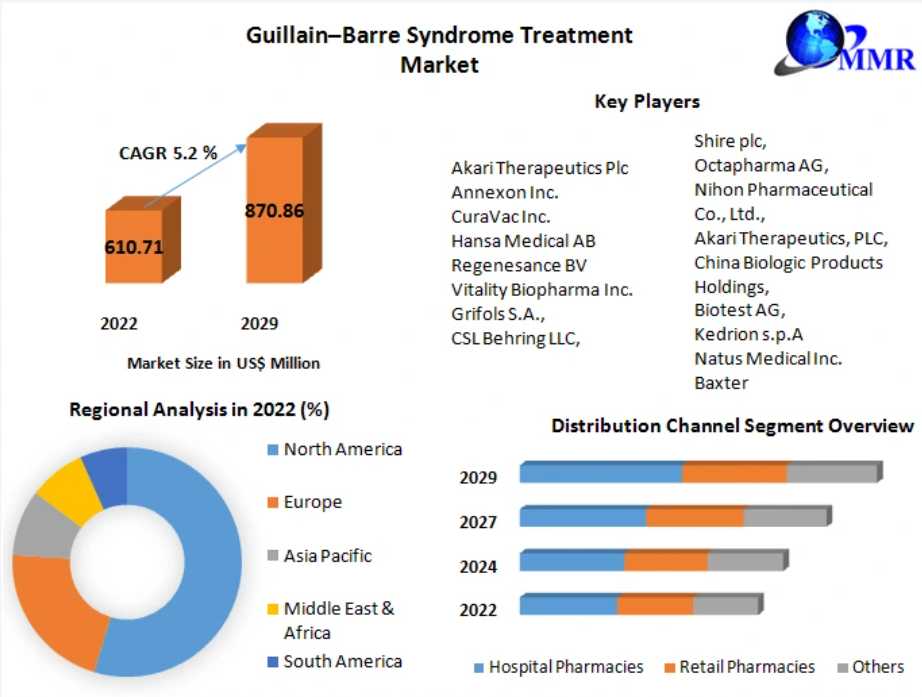
Guillain–Barre Syndrome Treatment Market Share, Trend, Segmentation And Forecast To 2029

Guillain–Barre syndrome treatment Market was valued US$ 610.71 Mn in 2022 and is expected to reach US$ 870.86 Mn by 2029, at CAGR of 5.2% during forecast period of 2023 to 2029.
Guillain–Barre syndrome treatment Market Overview
Over the forecast period, Maximize Market Research expects the Guillain–Barre syndrome treatment Market growth from USD in 2022 to USD in 2029 at a CAGR of percent. The report analyzed by Maximize Market Research, on the Guillain–Barre syndrome treatment market, covers an extensive regional analysis and competitive landscape.
Guillain–Barre syndrome treatment Market Report Scope and Research Methodology
The report is a thorough analysis of the Guillain–Barre syndrome treatment market provided with key findings including Pricing, investments, expansion plans, and physical presence in the Guillain–Barre syndrome treatment market. The bottom-up approach was used to underst and the Guillain–Barre syndrome treatment market size estimation and growth rates in the report. The report provides information on the drivers, restraints, opportunities, and challenges of the Guillain–Barre syndrome treatment market. The financial standing, portfolio, technology adoption, merger and acquisition, joint ventures and strategic alliances are included in the competitive environment for the Guillain–Barre syndrome treatment market.
The report includes primary and secondary collection techniques with qualitative and quantitative approaches for the analysis of the Guillain–Barre syndrome treatment market. The primary collection method includes Surveys, questionnaires and telephonic interviews with market leaders and business owners. The secondary method includes financial reports, annual reports, press releases, white papers, etc. SWOT analysis is used to identify the threats and weaknesses of the market while PORTER is used to understand the competitive intensity of the industry in the Guillain–Barre syndrome treatment Market.
Request a Free Sample Copy or View Report Summary: https://www.maximizemarketresearch.com/request-sample/38724
Guillain–Barre syndrome treatment Market Regional Insights
The Regional Analysis in the report helps to understand the Guillain–Barre syndrome treatment market in various countries. The report includes a thorough analysis of all the factors, market size, growth rate, and import and export in regions. The Guillain–Barre syndrome treatment market is broadly segmented into North America, Europe, Asia Pacific, Latin America, the Middle East, and Africa.
Guillain–Barre syndrome treatment Market Segmentation
by Product
Acute inflammatory demyelinating polyradiculoneuropathy
Miller Fisher syndrome treatment
Acute motor axonal neuropathy
Acute motor-sensory axonal neuropathy
by Therapeutics
Intravenous Immunoglobulin
Plasma Exchange
Others (Analgesics, Anticonvulsants, LMWH, etc.)
by Distribution Channel
Hospital Pharmacies
Retail Pharmacies
Others (Home Care, Clinics, etc.)
Get to Know More About This Market Study: https://www.maximizemarketresearch.com/market-report/global-guillain-barre-syndrome-treatment-market/38724/
Guillain–Barre syndrome treatment Market Key Players
1. Akari Therapeutics Plc
2. Annexon Inc.
3. CuraVac Inc.
4. Hansa Medical AB
5. Regenesance BV
6. Vitality Biopharma Inc.
7. Grifols S.A.,
8. CSL Behring LLC,
9. Shire plc,
10.Octapharma AG,
11.Nihon Pharmaceutical Co., Ltd.,
12.Akari Therapeutics, PLC,
13.China Biologic Products Holdings,
14.Biotest AG,
15.Kedrion s.p.A
16.Natus Medical Inc.
17.Baxter
Key questions answered in the Guillain–Barre syndrome treatment Market are:
- What is Guillain–Barre syndrome treatment?
- What was the Guillain–Barre syndrome treatment market size in 2023?
- What is the growth rate of the Guillain–Barre syndrome treatment Market?
- Which are the factors expected to drive the Guillain–Barre syndrome treatment market growth?
- What are the different segments of the Guillain–Barre syndrome treatment Market?
- What growth strategies are the players considering to increase their presence in Guillain–Barre syndrome treatment?
- What are the upcoming industry applications and trends for the Guillain–Barre syndrome treatment Market?
- What are the recent industry trends that can be implemented to generate additional revenue streams for the Guillain–Barre syndrome treatment Market?
- Who are the leading companies and what are their portfolios in Guillain–Barre syndrome treatment Market?
Key Offerings:
- Past Market Size and Competitive Landscape (2018 to 2023)
- Past Pricing and price curve by region (2018 to 2023)
- Market Size, Share, Size & Forecast by different segment | 2023−2029
- Market Dynamics – Growth Drivers, Restraints, Opportunities, and Key Trends by Region
- Market Segmentation – A detailed analysis by segment with their sub-segments and Region
- Competitive Landscape – Profiles of selected key players by region from a strategic perspective
- Competitive landscape – Market Leaders, Market Followers, Regional player
- Competitive benchmarking of key players by region
- PESTLE Analysis
- PORTER’s analysis
- Value chain and supply chain analysis
- Legal Aspects of Business by Region
- Lucrative business opportunities with SWOT analysis
- Recommendations
About Maximize Market Research:
Maximize Market Research is a multifaceted market research and consulting company with professionals from several industries. Some of the industries we cover include medical devices, pharmaceutical manufacturers, science and en Guillain–Barre syndrome treatmenteering, electronic components, industrial equipment, technology and communication, cars and automobiles, chemical products and substances, general merchandise, beverages, personal care, and automated systems. To mention a few, we provide market-verified industry estimations, technical trend analysis, crucial market research, strategic advice, competition analysis, production and demand analysis, and client impact studies.
Contact Maximize Market Research:
3rd Floor, Navale IT Park, Phase 2
Pune Banglore Highway, Narhe,
Pune, Maharashtra 411041, India
sales@maximizemarketresearch.com
+91 96071 95908, +91 9607365656
Author Bio
Article Comments
No Comments!
At present there are zero comments on this article.
Why not be the first to make a comment?
Similar Articles
Search Pages
User Upgrade
account to full use of editor,
Including hyperlinks
Article Categories
There are zero sub-categories in this parent category.
There are zero sub-categories in this parent category.

















